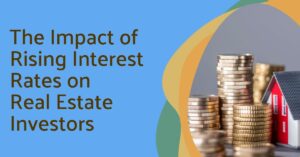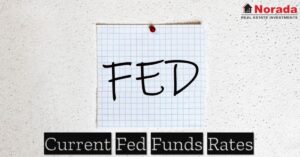Home buyers rejoice when interest rates drop, but rising interest rates can actually be a good thing for investors. Because high rates make homes less affordable, the rental market improves, giving real estate investors a chance to improve cash flow and increase their return on investment. In this article, we will explore how rising interest rates affect real estate investors and the various areas where they can benefit.
How Rising Interest Rates Affect Real Estate Investors?
Mortgage Rates and Financing:
For investors participating in all-cash deals, higher interest rates don't have much of an impact on the cost of acquiring new investment properties. This is because they don't rely on financing and can purchase properties outright. However, investors who rely on financing, such as taking out a mortgage, will pay more for residential and commercial buildings due to the higher interest rates.
Let's consider an example: Suppose an investor wants to purchase a rental property for $300,000 with a 20% down payment and a 30-year fixed-rate mortgage. If the interest rate is 4%, their monthly mortgage payment would be approximately $1,145. However, if the interest rate increases to 5%, the monthly payment would rise to around $1,288. This slight increase in mortgage costs needs to be factored into the investor's cash flow analysis.
Rental Rates:
When interest rates increase, potential homebuyers may find it more challenging to afford a home. Some buyers may postpone their purchase or choose to rent until rates decrease. This shift in demand from buying to renting can benefit real estate investors. The increased demand for rental units allows investors to raise rental rates, ultimately increasing their monthly cash flow.
Let's consider an example: Imagine an investor who owns a single-family home that was previously rented for $1,500 per month. Due to rising interest rates, potential buyers are opting to rent, leading to increased demand. The investor can raise the rent to $1,700 per month, resulting in an additional $200 of monthly income. Over the course of a year, this would amount to an extra $2,400 in cash flow, which can help offset any increased mortgage costs.
Occupancy Rates:
Rising interest rates can also have a positive effect on occupancy rates in the rental market. When interest rates are low, it's more affordable for renters to finance home purchases. As a result, some renters decide to buy their own homes, leaving investors with vacant units. However, when interest rates increase, renters are more likely to stay in their rental units, keeping occupancy rates steady.
Consider an example: In a particular apartment complex, there are 50 units. During a period of low interest rates, 10 renters decide to purchase their own homes. As a result, the occupancy rate drops to 80% (40 out of 50 units are occupied). However, when interest rates rise, potential buyers may hesitate to enter the housing market, leading to fewer tenants leaving to purchase homes. This can help maintain a higher occupancy rate, ensuring a consistent stream of rental income for real estate investors.
Cap Rates:
Interest rates not only influence the amount of mortgage capital available but also affect property values and net operating income (NOI). If an investor can raise rental rates without incurring additional expenses, the NOI increases. Provided the property's value stays the same, an increase in NOI results in an increased cap rate.
For instance, let's say an investor owns a commercial property that generates an annual NOI of $100,000. With a property value of $1 million, the cap rate is 10% ($100,000/$1,000,000). If rising interest rates allow the investor to raise rents and increase the annual NOI to $110,000 while the property value remains the same, the cap rate would increase to 11% ($110,000/$1,000,000). This indicates a higher return on investment for the investor, despite the potential decrease in property value.
Summary: Impact of Rising Interest Rates on Real Estate Investors
The impact of rising interest rates on real estate investors is multifaceted. While higher rates can increase the cost of purchasing an investment property and potentially lower property values, they also create favorable conditions in other areas. Real estate investors can benefit from rising interest rates through increased rental rates, improved occupancy rates, and higher cap rates.
By raising rental rates in response to increased demand from potential buyers who are hesitant to purchase homes due to higher interest rates, investors can improve their cash flow and overall profitability. Additionally, the stability of occupancy rates ensures a consistent stream of rental income, reducing the risk of vacant units.
Furthermore, rising interest rates can lead to an increase in net operating income (NOI) and subsequently result in higher cap rates. This indicates a higher return on investment for investors, even if property values experience a slight decline.
It is important for real estate investors to carefully analyze the impact of rising interest rates on their investment strategies. While there may be some additional costs associated with financing, the potential benefits in terms of increased rental income and improved returns can outweigh these expenses.
Work with Norada in 2025, Your Trusted Source for
Turnkey Real Estate Investing
Discover high-quality, ready-to-rent properties designed to deliver consistent returns.
Contact us today to expand your real estate portfolio with confidence.
Contact our investment counselors (No Obligation):
(800) 611-3060



